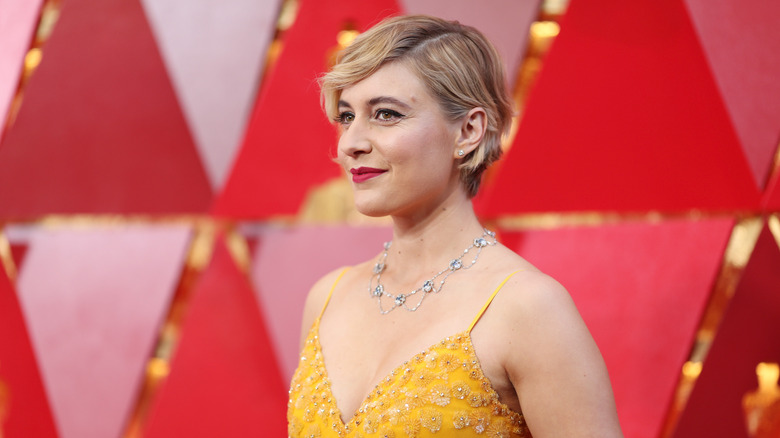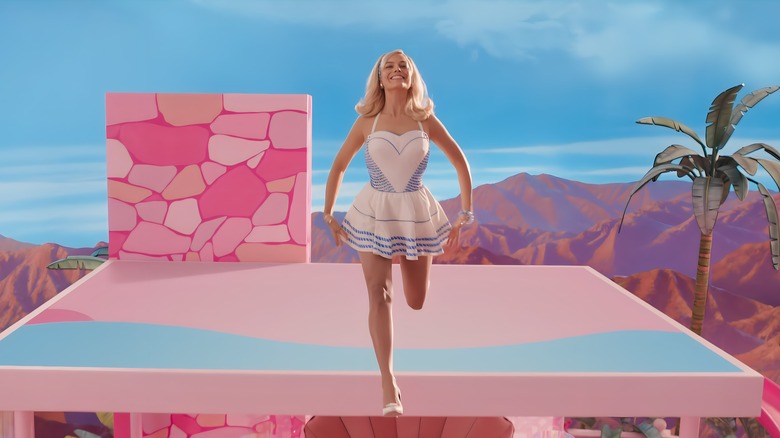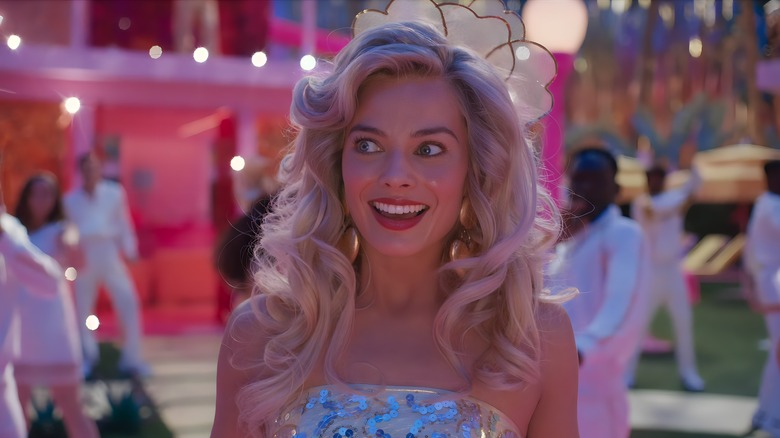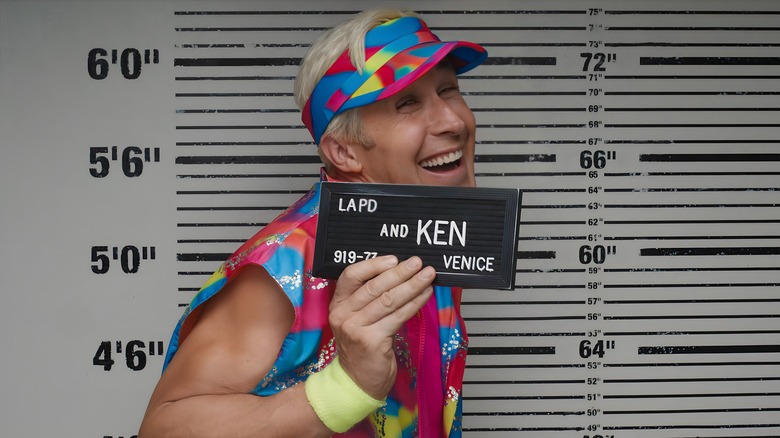Barbie's Greta Gerwig & Margot Robbie Oscar Snubs Are Upsetting - But Unsurprising
When Jack Quaid and Zazie Beetz donned formalwear to announce 2024 Academy Award nominations, audiences knew that there would be at least a few egregious snubs to complain about after all was said and done, and there were plenty in the end.
Greta Lee wasn't nominated for her stunning lead turn in "Past Lives," none of the performers in "May December" scored an acting nomination, and "The Color Purple" ended up being shut out of all major categories except best supporting actress. Leonardo DiCaprio, a perennial Oscar favorite, failed to land a best actor nomination in favor of unexpected picks like Bradley Cooper, who played famed composer Leonard Bernstein in "Maestro" (and directed the movie to boot). Perhaps the worst snubs of all, though, were in best director and best leading actress.
Greta Gerwig officially became the first female director to direct three best picture candidates — and she's still only been nominated for directing for one of them (her 2017 directorial debut, "Lady Bird"). Yes, Gerwig was shut out of best director in favor of surprising candidates like Justine Triet for "Anatomy of a Fall" and Jonathan Glazer for "The Zone of Interest," alongside surefire bets like Martin Scorsese ("Killers of the Flower Moon"), Yorgos Lanthimos ("Poor Things"), and likely winner Christopher Nolan ("Oppenheimer").
Beyond Gerwig's snub, there's also Margot Robbie. Despite "Barbie" being nominated for best picture, the woman who played Barbie wasn't nominated for best leading actress, losing her spot to left-field picks like Annette Bening ("Nyad") and Carey Mulligan ("Maestro"). In the end, these snubs are dispiriting but utterly unsurprising. Here's why.
Female directors are snubbed by the Academy more often than not
Year after year, the best picture race is predominantly occupied by movies helmed by men (white men, more often than not), with only a few women breaking through to secure a nomination. It's important to note that, in the Academy's 95-year history, only three women have ever won the top prize (Kathryn Bigelow for "The Hurt Locker" in 2009, Chloé Zhao for "Nomadland" in 2021, and Jane Campion for "The Power of the Dog" in 2022). It's also important to say that, at the 96th Oscars that will take place this year, French director Justine Triet is the sole woman recognized in the category.
This is an obvious and systemic issue; in 2023, zero female directors were nominated, despite potential candidates like Sarah Polley, Charlotte Wells, and Maria Schrader making impressive films in 2022.
Greta Gerwig is actually a pretty fascinating example of a woman who frequently receives half-hearted, seemingly insincere honors from the Academy without actual, tangible recognition. Yes, she was nominated for directing "Lady Bird," but she lost to Guillermo del Toro for "The Shape of Water" and was up against only men. Her sophomore effort, "Little Women," scored a best picture nod and ignored Gerwig's considerable work from behind the camera. Now, with "Barbie," Gerwig has been shut out for her third critically acclaimed film, as if this movie and "Little Women" simply directed themselves and became excellent works of art. Gerwig's snub is egregious, but it's also par for the course at this point because the Academy Awards apparently don't consider female directors to be even with their male colleagues.
Comedies are rarely taken seriously — and the Academy always overlooks them
Margot Robbie is technically an Oscar nominee at the 96th Academy Awards — but not for her performance in "Barbie." As the movie's executive producer, she earned a nomination for its inclusion in the best picture category. This is, at face value, pretty shocking ... especially when you consider that Robbie was, perhaps, edged out by Carey Mulligan in Bradley Cooper's oft-maligned biopic "Maestro."
Robbie does something fairly spectacular in "Barbie," considering that she transforms America's most famous doll into a fully realized character. Robbie's vision of Barbie — aided in no small part by Greta Gerwig's excellent yet unrecognized direction and the script she co-wrote with her partner Noah Baumbach — sends her on a journey that transforms her into a real person, someone desperate to become the one who imagines instead of a simple idea. In doing all of this, Robbie commits one of the biggest sins possible in the eyes of the Motion Picture Academy — she's funny.
Comedy is so consistently overlooked at the Oscars that when Marisa Tomei won for her pitch-perfect performance in "My Cousin Vinny" in 1992, rumors swirled for years that presenter Jack Palance read the wrong name. Robbie's portrayal is heartfelt, emotional, and compelling, but she also goes for broad comedy, showing off the full range of her acting ability by combining pratfalls with tearful admissions. The Oscars rarely, if ever, reward comedy, likely because it's not viewed as "serious" art compared to biopics or movies that make people feel completely depressed. Robbie's performance is yet another example of that irritating trend.
Barbie made a lot of money at the box office. Does that lessen its artistic achievement?
Anyone excusing "Barbie's" egregious omissions in best director and leading actress will simply point to the fact that the movie broke multiple box-office records and made Greta Gerwig the first female director to single-handedly helm a movie that crossed the billion-dollar mark. All of these accomplishments might have hurt its full Oscar potential in the end, though.
Blockbusters, like comedies, were staunchly ignored by the Academy for most of its history — until outcry over Christopher Nolan's universally adored Batman take, "The Dark Knight," won a posthumous acting award for Heath Ledger without managing a best picture nomination. From 2010 on, the best picture category expanded to ten potential winners, usually tossing a blockbuster into the fray to appease fans and draw a bigger audience for the telecast. Movies like "Black Panther," "Top Gun: Maverick," and "Mad Max: Fury Road," just to name a few, were never going to win best picture, but were nominated to keep complaints to a minimum.
"Barbie's" billion-dollar box-office haul has relegated it to the "token blockbuster" role this year. This is made particularly obvious considering that it's nominated alongside several smaller independent films. "Oppenheimer" was also a high-grossing cinematic juggernaut in 2023, but unlike "Barbie," "Oppenheimer" is more likely to be regarded as "serious" because it's a historical biopic about the creation of the atomic bomb ... while "Barbie" apparently loses artistic merit with each dollar it makes.
The nominations Barbie did get at the Academy Awards are sort of insulting without Director and Actress
"Barbie" ended up with best picture and best adapted screenplay nominations, but it also scored two acting nods in the supporting categories. America Ferrera, who plays Mattel employee Gloria and delivers the film's most memorable monologue, earned her first-ever Oscar nomination for supporting actress. Unsurprisingly, Ryan Gosling ended up with a nomination for supporting actor — which is a problem.
Gosling's performance is, to be fair, truly excellent. He shines in every single second of the film, committing to his role as the hapless, horse-obsessed Ken with the utmost passion. His dream ballet, set to the Oscar-nominated original song "I'm Just Ken," is certainly one of the movie's standout moments. That said, it's a bit on the nose to nominate Gosling and not Margot Robbie, considering that one of the film's main conflicts is that Ken overthrows the matriarchy of Barbie Land to install a patriarchy and become the society's "main character," of sorts.
Nominating the only standout male character from a movie about the female experience — and not the film's lead — is, frankly, insulting, as are the other major "Barbie" nominations. Unless it pulls a full "Argo," its chances of winning best picture are utterly insignificant without Greta Gerwig in the best director category. Its screenplay nod feels like the Academy giving a small consolation prize to a movie that feels too weird or "unworthy" to win the big prize. (See also: "Get Out," "Promising Young Woman")
Ultimately, "Barbie" being overlooked in majorly important categories isn't all that shocking ... but it does continue a disturbing, unsettling trend of not taking movies seriously if they're too funny, feminine, or fantastical.




